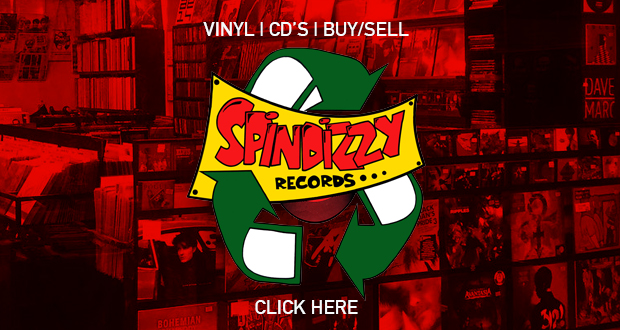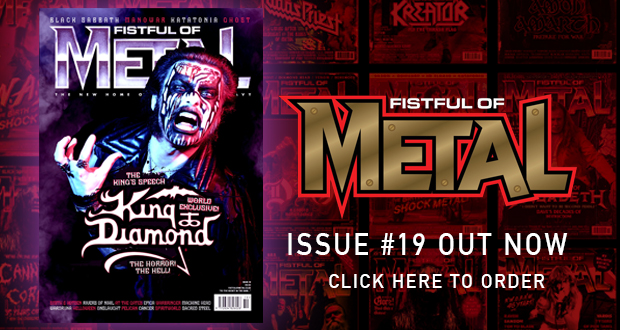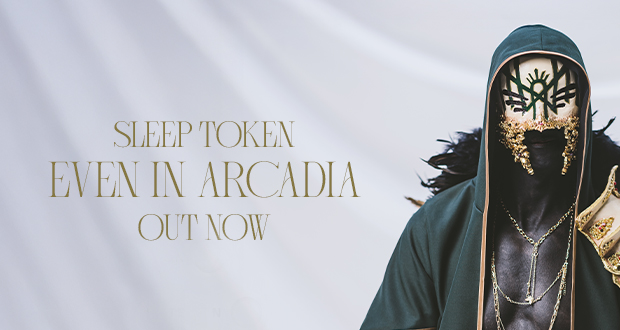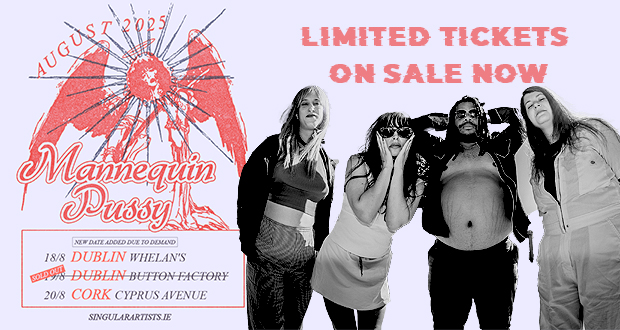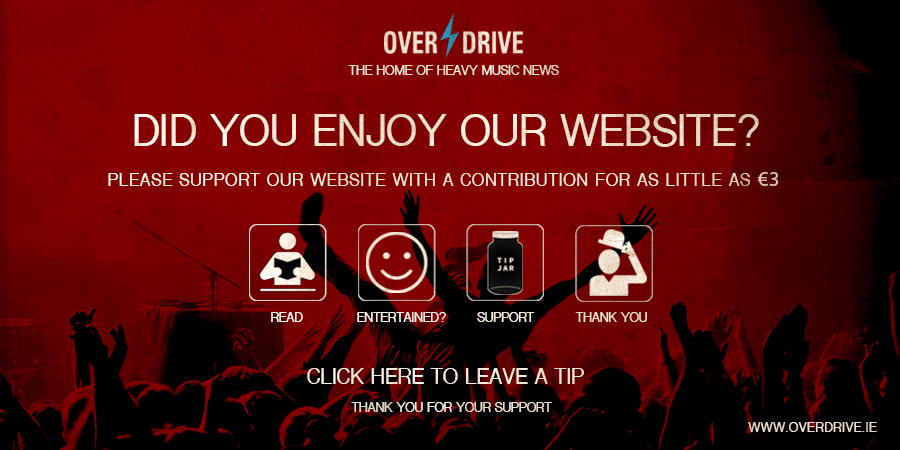BLAAKYUM – LEBANESE THRASH VETERAN, BASSEM DEAIBESS TALKS ‘ART AS DEFIANCE IN THE MIDDLE EAST’ AND MORE!
When you think of metal music, Lebanon does not come to mind as being a source for our beloved genre, however, Beirut natives BLAAKYUM have been pushing the boundaries of their countries cultural boundaries for almost 22 years with their unique brand of thrash/groove metal infused with elements of Middle Eastern and Levantine folk. Overdrive talks with vocalist Bassem Deaibess ahead of his invitation to speak today (April 5th) for a seminar titled “Art As Defiance In The Middle East” at Chatham House in London.
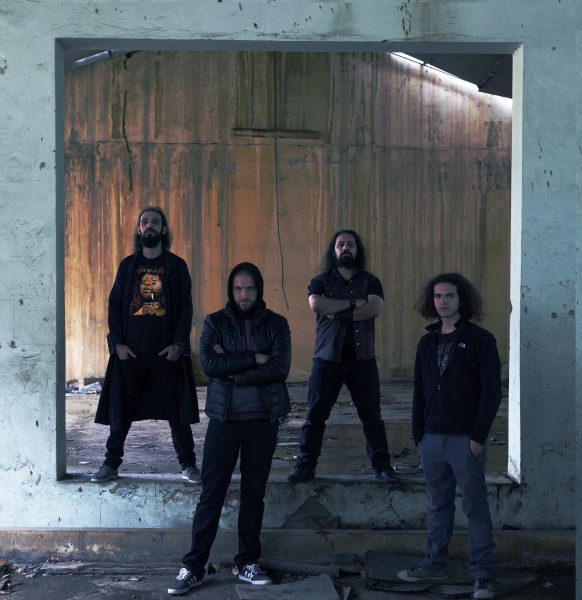
Formed in Lebanon in 1995, award-winning thrash metallers Blaakyum have spent the last 22 years honing their craft to perfection.
Sporting a unique blend of thrash and groove metal infused with Middle Eastern and Levantine folk music vibes, they’ve come to be known as pioneers of the “Middle Eastern Thrash” sound. Their influences range from thrash titans Metallica, Testament, Overkill, Annihilator, Onslaught, and Slayer to Iron Maiden but also oriental music icons such as Fairouz, Sabah and Marcel Khalife.
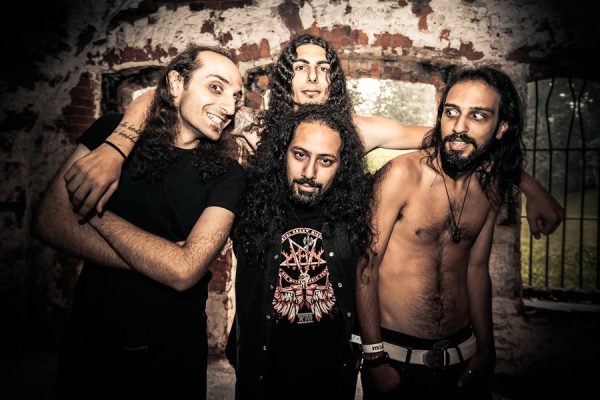
OD – Firstly, can you talk a little about the legacy of Blaakyum, as the band has been in operation now for almost 20 years? Do you find that you led a pathway for other Lebanese metal bands to follow?
BASSEM – Blaakyum was founded in 1995, back then the Metal community was healthy and big. We were one of the bands from the first generation after the civil war. We were the first Lebanese Metal band to tour independently in Egypt, then Lebanon, Ukraine, Slovakia, Slovenia and Poland in 2012. In 2013 we were the first Lebanese band to perform on the main stage at MetalDays. In 2014 Blaakyum was the first ever local band to perform in a major Lebanese international festival called “Byblos International Festival” supporting Epica.
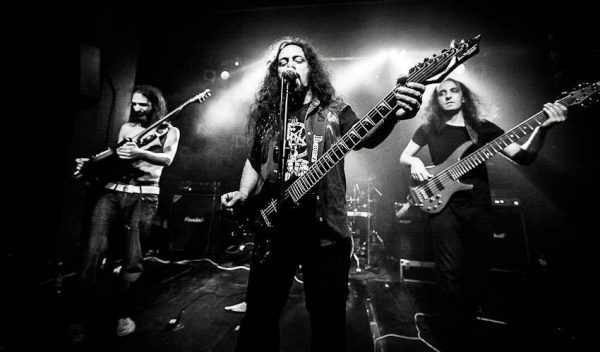
In 2015 Blaakyum won the Middle Eastern Metal Battle and represented the Middle East at Wacken Open Air Metal Battle 2015 and won 3rd place in the worldwide finals. In June 2016 our sophomore album “Line Of Fear” was released followed by a European tour that kicked off in Helsinki at Tuska Open Air Festival 2016 and then proceeded in support of British Thrash legends Onslaught on their 16-date European tour in 8 countries. We do not think that we led the path per se.
We were influenced by bands who came before us in our local scene such as Exceed, Dogma, Electric Warriors and Red Hell and maybe we have influenced newer bands. I think what we did is that we showed that if you want something and work hard for it, you will eventually get it.
OD – Your most recent album ‘Line of Fear‘ was finally released in 2016, after what seemed like a very long process since you began recording in 2013. Was the whole experience of producing and releasing this album, somewhat of a rebirth for the band?
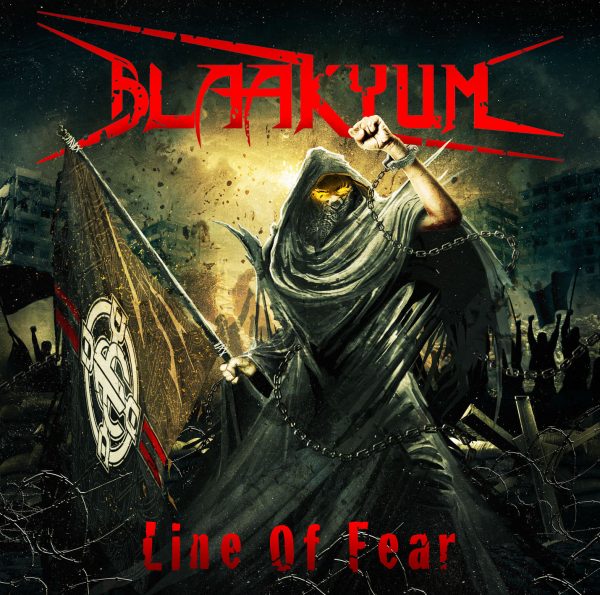
BASSEM – The recording process for Line Of Fear started in December 2015. But we had started writing the new songs for that album since we toured Eastern Europe in 2012. I can safely say that the rebirth of the band happened when my younger brother Rabih Deaibess joined Blaakyum in 2012 right before our first European tour. He just took the band to a whole new level, it was then that Blaakyum started to modernise its sound.
OD – Being such an inspiration to many other metal bands, do you find that you have almost become the metal ambassadors for Lebanese metal over the past years and if you could do anything to help the local scene, what would it be?
BASSEM – We hope we have become one of the Lebanese Metal Ambassadors alongside other bands from our local scene. But I hope that through all what we have achieved so far, from winning 3rd place at Wacken to performing at Tuska Open Air and touring Europe with Onslaught, and our upcoming UK tour in the summer of 2017, we would be opening the eyes of the world and the international Metal community to the fact that Lebanon has one of the most vibrant Metal scenes in the Middle East.
Ever since Blaakyum started making it in the international scene, we made sure that everybody knew about our local scene back home, that against all the obstacles and the crackdowns by the Lebanese authorities on Metalheads, the scene still persists though that’s largely due to individual efforts and persistence.
OD – There is no question that music is a tremendous form of communication and can break down barriers between cultural and language barriers. However, I feel that it also serves as a means to sharing experiences and information that in most cases, political authorities try to mute. Have you experienced anything like this since your time in the band?
BASSEM – I am not sure actually this is totally true. At least from my experience, political authorities do not feel that Metal music is an efficient rebel tool. They only try to mute it because they demonise it and use it as a scapegoat to cover their failures and fuck-ups. It can get ridiculous, in the sense that the authorities would immediately investigate a claim of devil worshipping while actual murderers and criminals slip away or even are ignored by those same security forces. But the reason they get away with it is the ignorance of our people.
OD – You have been invited to speak at a seminar in London titled ‘Art As Defiance In The Middle East‘ on April 5th, can you talk a little about how this came about?
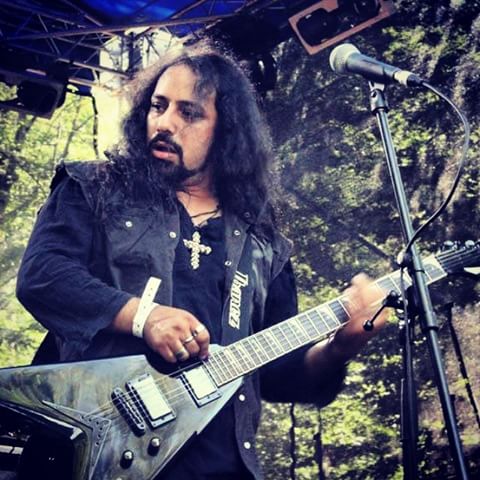
BASSEM – The invitation to speak at this event at Chatham House was motivated by Blaakyum’s experience as a band whose story is built on defying oppression.
OD – It must feel liberating to have the opportunity to speak on behalf of your own personal experience, especially as you are representing a genre of music that is most overlooked not only in your own country but in the context of world music in general. Do you feel a sense of pride to have this opportunity to talk to a captive audience about your journey as a metal musician in Lebanon?
BASSEM – Given that Metal was born out of political circumstances and given that Metal is among the most politicised genres of music, it is about time that we get recognised by the political establishment as thought leaders and I need to strongly complement The Royal Institute of International Affairs aka Chatham House for being the first policy institution to grant such a platform.
OD – Have you ever done anything like this before as I’m sure (like any band) you have to stick up for what you believe in and make sacrifices for what you want to do artistically?
BASSEM – I did participate in few TV talk shows, especially in 2008 on a famous night talk show in Lebanon called “Thick Red Line” when the subject was “Rebellion through music“. Also in 2012 when we had to face a renewed wave of anti-Metal inquisitions and witch hunts in Lebanon, I was the head of a delegate of three people from the Metal scene to go on TV and fight back.
OD – Regarding the Metal scene in Lebanon, can you talk a little about how popular the genre is doing right now and any bands that we should be looking out for?
BASSEM – Metal always had a very solid underground scene. At times it even was part of the mainstream, in the mid-80s and early 90s. Today I can say we have a fairly good scene, with its ups and downs. Sadly the glory days of the Lebanese Metal scene were between19 95 and 2010 when we had over 50 active Metal bands and our gigs would gather anything between 500 and 3000 fans.
Listen to ‘Line Of Fear‘ on the streaming link below:
Today the average number of concert attendees is 200. But ever since the Wacken Open Air Middle East Metal Battle took place in 2015 organised by our local Metal webzine called Metal Bell (a great source of information on everything Metal in the Middle East) the scene has been slowly regaining its former shape. A lot of the old pillars of the Metal scene are coming back together such as Kaoteon (Extreme Metal) and Damage Rite (previously Postmortem, Thrash Metal) and also we have the Lebanese ‘Ambassadors of Doom’ Kimaera (Doom/Death Metal) and Lebanon’s loudest Death Metallers InnerGuilt.
Traditional Heavy Metal’s battle flag is always kept high by Zix. We have a healthy Progressive Metal and Rock scene, lead by the band Turbulence. We also have new up-and-coming bands that are taking the scene by storm such as Eden (Thrash Metal), Within Destruction (Metalcore) and Slave To Sirens (Thrash). The Lebanese Metal scene is actually a very vibrant place; it is sad that we do not really have much support in the international Metal music industry.
Check out Blaakyum’s ‘Freedom Denied‘ lyric video below;
OD – With music so readily available now thanks to the dramatic advances in digital technology, do you look back at how difficult it was trying to get your hands on new music when you were growing up?
BASSEM – Before 1996 it was really easy to get Metal, we had dedicated Metal record stores, Rock and Metal were played on shows on most of the Lebanese national and private radios and on our local TV stations. It was just after the ban on Metal music in 1996 that most Metal bands got blacklisted and their music became harder to find. So we relied heavily on the bootleg tape trade. Ironically we used to get most of our music from Syria, where Metal was not banned till 2003. Afterwards, the internet became our source of getting the music we need.
OD – When you look back to 1998 when released ‘Am I Black‘ and the adversary reaction from political and religious groups to where things are today, do you feel a sense of accomplishment for standing up for something that you believe in, especially when you see the likes of Beirut Metal Fest and like-minded events?
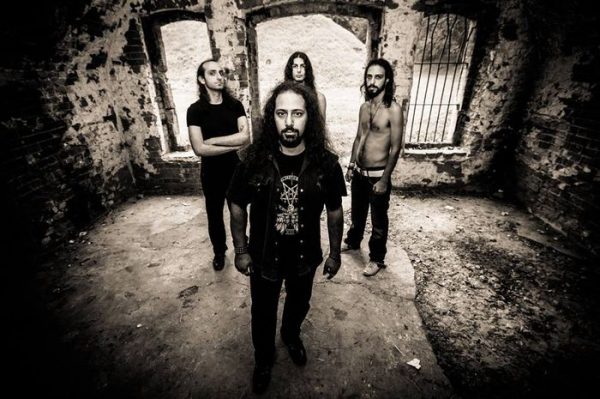
BASSEM – We always had the ability to slip from the system and make our own metal festivals. In January 1996 I organised the first ever proper Metal gig after the civil war and it was done in the theatre of the Lebanese University where I studied Psychology. In 2006 I opened Cherry’s Pub, which was the only Metal club in Lebanon, where we organised endless gigs and discovered many talented bands.
There were also many Metal festivals going on in the country during this decade. Afterwards local promotion agencies like Rock Ring, 2U2C brought international bands like Lake of Tears, Hail!, Anathema, Within Temptation, Katatonia and Moonspell to perform in Lebanon. It is true that Metal events died out for a bit after 2013 but then they were revived by a series of Metal fests organised by Metal Bell Magazine and YM Events. So in a way the Lebanese Metal scene NEVER gave in to oppression, we always found a way to rise again, after each blow.
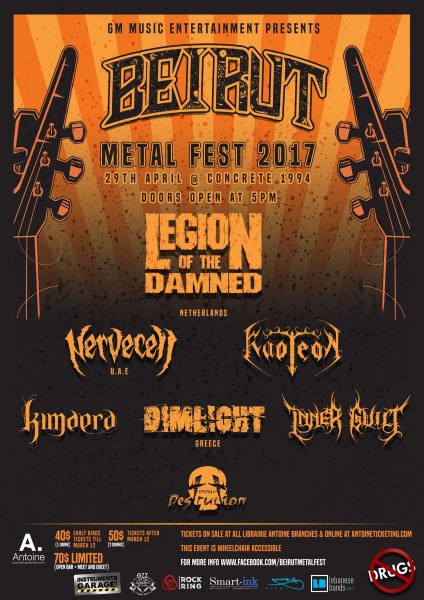 Beirut Metal Fest is just another example of our strength and resistance to bigotry. Also this year Blaakyum has invited Onslaught to perform a show in Lebanon and they will be the first ever authentic Thrash Metal band to play in Beirut on June 10th in our own Skull Session gig.
Beirut Metal Fest is just another example of our strength and resistance to bigotry. Also this year Blaakyum has invited Onslaught to perform a show in Lebanon and they will be the first ever authentic Thrash Metal band to play in Beirut on June 10th in our own Skull Session gig.
OD – What are Blaakyum’s plans for the remainder of the year?
BASSEM – We have so much going on, we are finalising the new album material, almost done there, the album title and track list will be announced soon. We will be touring the span of the UK this summer, dates are being negotiated as we speak. And there’s more yet to come…
OD – Having waited so long between albums, do you have an estimate of when the follow up for ‘Line of Fear‘ will be?
BASSEM – The material is almost ready, but it is just a matter of when we will be able to record. Unlike in Europe and the UK we do not have professional Metal recording studios in Lebanon, so we need to travel to Europe to record and this requires a LOT of money, effort and time. We’re finalising our plans right now so stay tuned.
OD – Finally, if you had the power to change anything within the music industry from your experience, what would it be?
BASSEM – I would change the whole industry. Metal bands have had to accommodate an industry that is increasingly consumed by profit-making and therefore becoming more conservative about taking a chance on “unsafe” bets; if left to its own devices, the industry would have killed Metal 20 years ago. So we are lucky to be in the age of the internet when profit-obsessed industry actors have lost most of their powers and in which the ones that cater for the fans are surviving. If I could change something I would make the industry base its decisions on the fans’ reaction to bands, rather than choose what bands to force on fans.
Bassem will be speaking today (April 5th) in London’s Chatham House as part of a special seminar entitled “Art as Defiance in the Middle East”. Please visit this link for more details.
‘Line Of Fear’ is out now and available from this link.
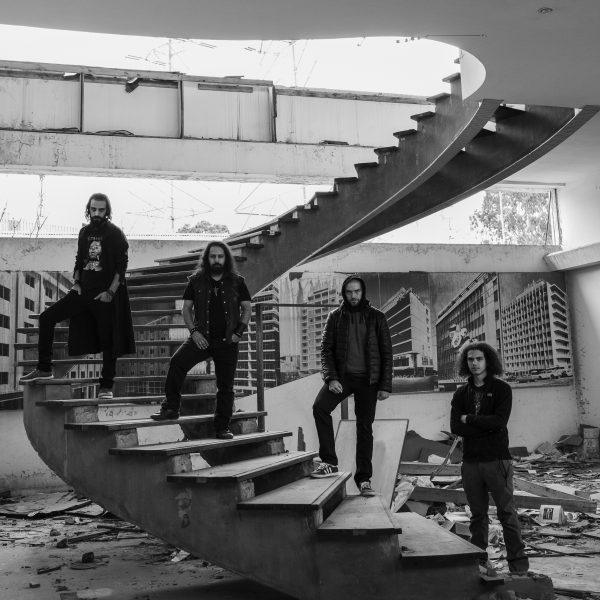
Oran O’Beirne
© OVERDRIVE.IE 2017

